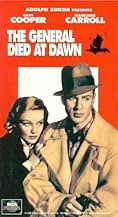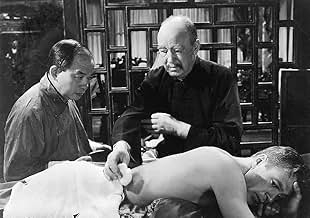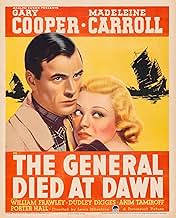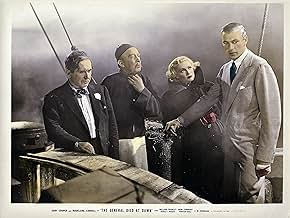VALUTAZIONE IMDb
6,5/10
1390
LA TUA VALUTAZIONE
Aggiungi una trama nella tua linguaAmid the anarchy of China, an American mercenary tangles with a ruthless warlord.Amid the anarchy of China, an American mercenary tangles with a ruthless warlord.Amid the anarchy of China, an American mercenary tangles with a ruthless warlord.
- Candidato a 3 Oscar
- 3 candidature totali
Lee Tong Foo
- Mr. Chen
- (as Lee Tung-Foo)
Hans Fuerberg
- Yang's Military Advisor
- (as Hans Furberg)
Irene Bennett
- Passenger
- (non citato nei titoli originali)
Spencer Chan
- Killer
- (non citato nei titoli originali)
Thomas Chan
- Houseboy
- (non citato nei titoli originali)
Trama
Lo sapevi?
- QuizThe main character, O'Hara, is based on the real-life adventurer Morris "Two-Gun" Cohen (1887-1970). Born in Poland to a Jewish family, Cohen grew up in the tough streets of London's East End. As a teenager, he moved to western Canada and became a ranch hand and gambler in Saskatchewan, and later a highly successful real-estate agent in Alberta. During World War I he fought in Europe with the Canadian Railway Troops. His friendship with Chinese workers on the Canadian-Pacific Railroad prompted him to go to China in the 1920s. After negotiating a railroad deal with Dr. Yat-sen Sun, Cohen became a personal bodyguard to Sun and a trainer of Sun's private army. After Sun's death in 1925, Cohen ran guns for various Chinese warlords throughout the 1930s. When the Japanese invaded China in 1937, Cohen continued to supply Chinese resistance forces with arms and served with the British SOE. In 1941, following the fall of Hong Kong, he was captured by the Japanese and put in a prison camp, but was traded to the English in 1943 in a rare prisoner exchange. After the war, Cohen continued to operate in China as an agent for various British firms, including Rolls-Royce and Decca Radar. His former dealings with Chinese warlords kept him in good standing with Chinese Communist officials until his death in 1970.
- BlooperWhile arguing with Peter, Judy slams a book down on the desk. A couple of other books on the corner of the desk disappear in a later scene.
- Curiosità sui creditiThe opening credits all appear on the sails of boats.
- ConnessioniFeatured in Red Hollywood (1996)
Recensione in evidenza
The General Died at Dawn, the title itself is enough of a giveaway as to what happens. But the circumstances leading up to the death of Chinese Warlord Akim Tamiroff is quite a tale.
The setting for this film is Kuomintang China where the government of Chiang Kai-Shek doesn't have its writ run very far. Most of China in the Twenties is controlled by various provincial warlords. In fact a case could be made that the Chinese Communists under Mao Tse-tung was viewed as just another warlord. But that's a whole different story.
American adventurer Gary Cooper has a money belt with a whole lot of cash in it entrusted to him by the opposition faction to Akim Tamiroff. He's supposed to make contact with William Frawley in Shanghai who when he's not drinking the hotel bar dry, runs guns.
But Madeleine Carroll and her father Porter Hall who are working for Tamiroff help Tamiroff part Cooper from his money. In the case of Coop, he's real guilty of thinking with his gonads. Then Porter Hall steals the money for himself and the film gets real interesting.
There's one big flaw in the film, occurring when Madeleine Carroll who starts falling for Cooper, refers to him as the "O'Hara Boy." O'Hara is Cooper's character name. Coop was 35 when this film was made and referring to him as 'boy' was ludicrous. But then again a man of 35 should have been on better guard. Film might have worked better if someone younger like Robert Taylor or Tyrone Power played the part of O'Hara. Or Clifford Odets's script should have given Carroll a more elaborate ruse to play on Cooper.
Two major oriental roles were given to occidental players. Casting like Akim Tamiroff as the warlord Yang and Dudley Digges as Mr. Wu who employs Cooper would never happen today. But both do well and come to think of it Tamiroff does have an oriental strain in his ancestry.
One bit of casting really hits home. By all accounts William Frawley was hardly the lovable tightwad Fred Mertz in real life. He was a misanthropic alcoholic in the tradition of W.C.Fields and a mean drunk when he was loaded which was often back then. His role as Brighton, the misanthropic, mean, and thoroughly racist gunrunner was way closer to the real Bill Frawley.
Gary Cooper in The General Died at Dawn was playing a role that Humphrey Bogart would probably have done in the forties. It was always joked that Cooper's dialog consisted of 'yup' and 'nope.' But the way he gets himself, Carroll and Digges out of a real predicament in the end called for quite a gift of gab.
The setting for this film is Kuomintang China where the government of Chiang Kai-Shek doesn't have its writ run very far. Most of China in the Twenties is controlled by various provincial warlords. In fact a case could be made that the Chinese Communists under Mao Tse-tung was viewed as just another warlord. But that's a whole different story.
American adventurer Gary Cooper has a money belt with a whole lot of cash in it entrusted to him by the opposition faction to Akim Tamiroff. He's supposed to make contact with William Frawley in Shanghai who when he's not drinking the hotel bar dry, runs guns.
But Madeleine Carroll and her father Porter Hall who are working for Tamiroff help Tamiroff part Cooper from his money. In the case of Coop, he's real guilty of thinking with his gonads. Then Porter Hall steals the money for himself and the film gets real interesting.
There's one big flaw in the film, occurring when Madeleine Carroll who starts falling for Cooper, refers to him as the "O'Hara Boy." O'Hara is Cooper's character name. Coop was 35 when this film was made and referring to him as 'boy' was ludicrous. But then again a man of 35 should have been on better guard. Film might have worked better if someone younger like Robert Taylor or Tyrone Power played the part of O'Hara. Or Clifford Odets's script should have given Carroll a more elaborate ruse to play on Cooper.
Two major oriental roles were given to occidental players. Casting like Akim Tamiroff as the warlord Yang and Dudley Digges as Mr. Wu who employs Cooper would never happen today. But both do well and come to think of it Tamiroff does have an oriental strain in his ancestry.
One bit of casting really hits home. By all accounts William Frawley was hardly the lovable tightwad Fred Mertz in real life. He was a misanthropic alcoholic in the tradition of W.C.Fields and a mean drunk when he was loaded which was often back then. His role as Brighton, the misanthropic, mean, and thoroughly racist gunrunner was way closer to the real Bill Frawley.
Gary Cooper in The General Died at Dawn was playing a role that Humphrey Bogart would probably have done in the forties. It was always joked that Cooper's dialog consisted of 'yup' and 'nope.' But the way he gets himself, Carroll and Digges out of a real predicament in the end called for quite a gift of gab.
- bkoganbing
- 27 ago 2006
- Permalink
I più visti
Accedi per valutare e creare un elenco di titoli salvati per ottenere consigli personalizzati
- How long is The General Died at Dawn?Powered by Alexa
Dettagli
- Data di uscita
- Paese di origine
- Lingua
- Celebre anche come
- The General Died at Dawn
- Luoghi delle riprese
- Azienda produttrice
- Vedi altri crediti dell’azienda su IMDbPro
- Tempo di esecuzione1 ora 38 minuti
- Colore
- Proporzioni
- 1.37 : 1
Contribuisci a questa pagina
Suggerisci una modifica o aggiungi i contenuti mancanti

Divario superiore
By what name was Il generale morì all'alba (1936) officially released in India in English?
Rispondi



































